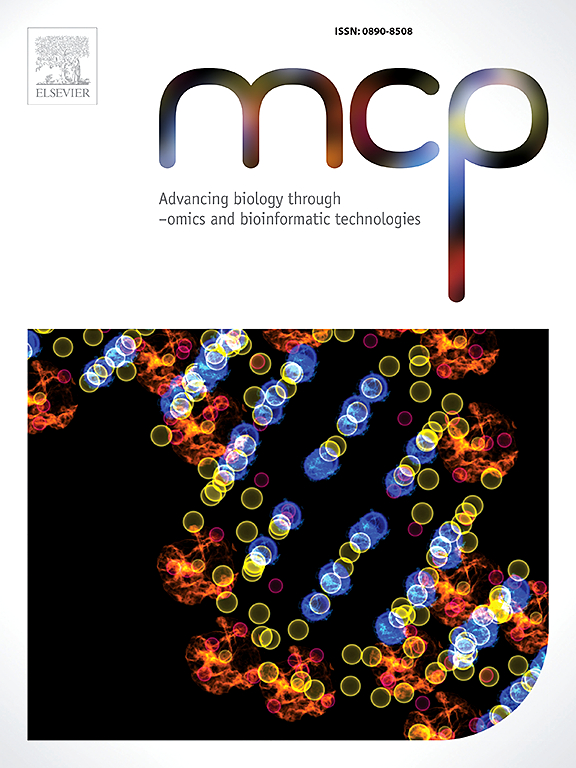APOA1-AS 在结直肠癌中的作用:研究其与恶性生物学行为的关系
IF 3
3区 生物学
Q3 BIOCHEMICAL RESEARCH METHODS
引用次数: 0
摘要
目的:结直肠癌(Colorectal cancer, CRC)是一种常见的高发病率和高死亡率的恶性肿瘤。长链非编码rna (lncRNAs)在癌症的发生和发展中起着至关重要的作用。本研究旨在探讨lncRNA APOA1-AS在结直肠癌中的作用,并阐明其潜在机制。方法:收集临床样本,进行高通量测序,鉴定结直肠癌中差异表达的lncrna。其中选择关键lncRNA APOA1-AS进行进一步研究。测定APOA1-AS在结直肠癌组织和细胞中的表达。通过在SW620和RKO细胞中下调和过表达APOA1-AS,评估APOA1-AS对细胞增殖、迁移、侵袭和凋亡的影响。此外,我们还研究了APOA1-AS与结直肠癌细胞恶性生物学行为的关系。进一步分析了APOA1-AS在糖代谢重编程和cGMP-PKG信号通路中的作用。结果:在结直肠癌中共鉴定出2985个差异表达的lncrna,其中APOA1-AS表达上调最为显著。APOA1-AS在结直肠癌组织中的表达明显高于正常组织。在SW620和RKO细胞中,APOA1-AS过表达促进细胞增殖、迁移和侵袭,同时抑制细胞凋亡。此外,APOA1-AS通过cGMP-PKG信号通路调节糖代谢重编程,增强肿瘤恶性生物学行为,促进肿瘤细胞耐药。结论:我们的研究表明APOA1-AS是结直肠癌发生发展的潜在关键调控因子。它通过糖代谢重编程和cGMP-PKG信号通路发挥作用,为结直肠癌的治疗提供了新的靶点。本文章由计算机程序翻译,如有差异,请以英文原文为准。
The role of APOA1-AS in colorectal cancer: Investigating its association with malignant biological behaviors
Purpose
Colorectal cancer (CRC) is a common malignant tumor associated with high morbidity and mortality. Long non-coding RNAs (lncRNAs) play crucial roles in cancer development and progression. This study aimed to explore the role of lncRNA APOA1-AS in colorectal cancer and elucidate its underlying mechanisms.
Methods
Clinical samples were collected, and high-throughput sequencing was performed to identify differentially expressed lncRNAs in colorectal cancer. Among these, the key lncRNA APOA1-AS was selected for further investigation. The expression of APOA1-AS in colorectal cancer tissues and cells was evaluated. The effects of APOA1-AS on cell proliferation, migration, invasion, and apoptosis were assessed through knockdown and overexpression of APOA1-AS in SW620 and RKO cells. Additionally, the relationship between APOA1-AS and the malignant biological behaviors of colorectal cancer cells was also investigated. Furthermore, the involvement of APOA1-AS in glucose metabolism reprogramming and the cGMP-PKG signaling pathway was analyzed.
Results
A total of 2985 differentially expressed lncRNAs were identified in colorectal cancer, including APOA1-AS, which showed the most significant upregulation. APOA1-AS expression was significantly higher in colorectal cancer tissues compared to normal tissues. Overexpression of APOA1-AS promoted cell proliferation, migration, and invasion while inhibiting apoptosis in SW620 and RKO cells. Furthermore, APOA1-AS was found to regulate glucose metabolism reprogramming, enhance tumor malignant biological behaviors and facilitate tumor cell drug resistance through the cGMP-PKG signaling pathway.
Conclusion
Our study demonstrates that APOA1-AS is a potential key regulator in colorectal cancer development and progression. It functions via glucose metabolism reprogramming and the cGMP-PKG signaling pathway, offering a novel therapeutic target for colorectal cancer.
求助全文
通过发布文献求助,成功后即可免费获取论文全文。
去求助
来源期刊

Molecular and Cellular Probes
生物-生化研究方法
CiteScore
6.80
自引率
0.00%
发文量
52
审稿时长
16 days
期刊介绍:
MCP - Advancing biology through–omics and bioinformatic technologies wants to capture outcomes from the current revolution in molecular technologies and sciences. The journal has broadened its scope and embraces any high quality research papers, reviews and opinions in areas including, but not limited to, molecular biology, cell biology, biochemistry, immunology, physiology, epidemiology, ecology, virology, microbiology, parasitology, genetics, evolutionary biology, genomics (including metagenomics), bioinformatics, proteomics, metabolomics, glycomics, and lipidomics. Submissions with a technology-driven focus on understanding normal biological or disease processes as well as conceptual advances and paradigm shifts are particularly encouraged. The Editors welcome fundamental or applied research areas; pre-submission enquiries about advanced draft manuscripts are welcomed. Top quality research and manuscripts will be fast-tracked.
 求助内容:
求助内容: 应助结果提醒方式:
应助结果提醒方式:


